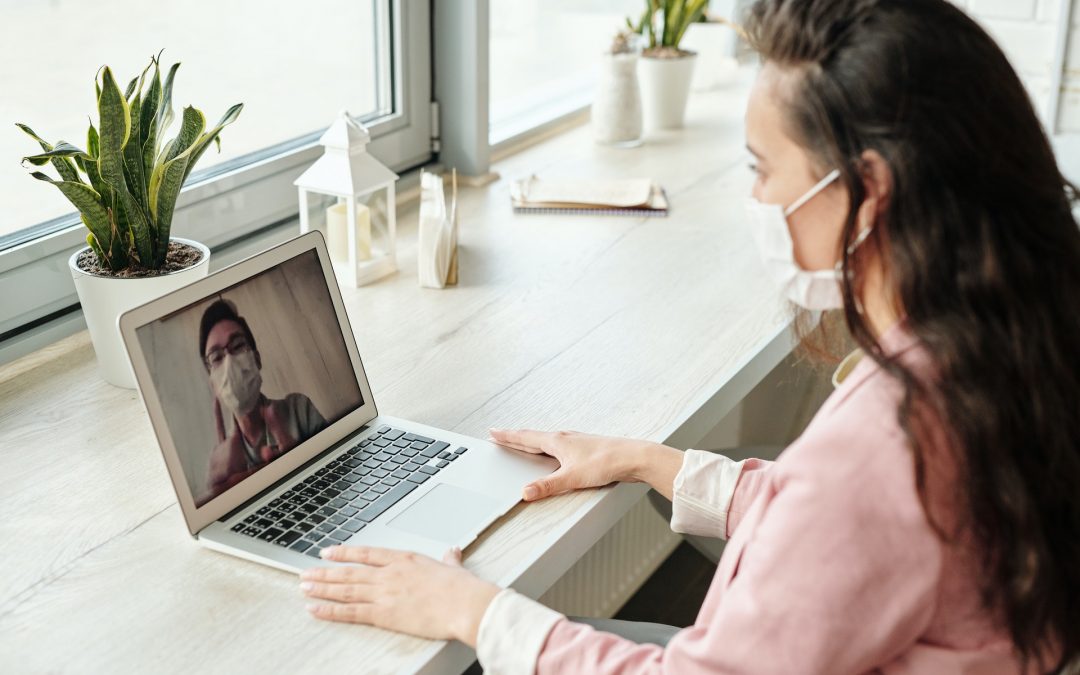The COVID-19 global pandemic has brought so much change and uncertainty into our lives these past few months. Some of you may have been experiencing increased stress, fear, or loneliness, and this can feel overwhelming during this challenging time. I have noticed that many people began to come to therapy for the first time because of this global pandemic. Online therapy has also brought people to therapy who otherwise would not have gone. First of all, PROPS TO YOU!! Taking that first step, setting up the appointment, and coming to therapy is hard (virtually or in person)! In this blog, I wanted to talk about the differences and feelings around video sessions vs. in-person sessions.
Video Sessions vs. In-Person Sessions
In order to help prevent the spread of the coronavirus, social distancing, wearing masks, and quarantining have all become new norms. During these unprecedented times, many therapists have begun to offer online sessions, and have begun the process of transitioning clients from in-person to video sessions during the quarantine. At the Works Counseling Center, we offer both. Whether you are meeting via video or phone, it isn’t quite the same as being in person. So, this will walk you through the differences, expectations, and different ways it may impact your therapy experience.
In-Person
In-person, or traditional talk therapy, sessions are typically face-to-face, and you meet with a therapist at a specific time and place, usually in their office. So, you will get the benefits of a real-time, face-to-face conversation, where verbal and non-verbal communication and tone of voice can give the therapist insight on what you’re feeling. In-person sessions also give the added benefit of human contact for those who may have been quarantined and may have not been around people in a while. Non-verbal and reading each other’s body language is an important part of in-person that you can’t do as well over video and is virtually impossible to do with just audio. In-person therapy can provide insight as well as more accountability for clients. The therapeutic relationship between the therapist and client is a crucial part of therapy and that tends to grow better with in-person sessions since you are in a safe environment and are face-to-face together in the same room.
Video
Video sessions allow the client to continue their work in therapy, but with the added convenience of having your session in the privacy of your own home, or wherever you may be. Online therapy can be flexible, save time, and even offer an alternative to someone who may feel self-conscious about coming in to therapy. Recent studies have shown that online therapy can be just as effective as in-person. That being said, video sessions are not for everyone and that’s okay! For some, it may be more difficult to feel like you are making a connection, build a therapeutic relationship, or stay focused during the session. In the transition to video, it may help to test out the software, find a quiet and private space to have sessions, and limit distractions. It may also help to have some ice breakers or to just simply discuss how different the online experience is for both therapist and client. Works Counseling Center uses Doxy.me as our main virtual service and Google Hangout as a backup option, and both are HIPAA compliant. A downside is that with technology there is always the chance of having internet or audio problems. So, it is important as a therapist to inform your clients about appropriate technology needed as well as any concerns that may arise and discuss what will happen if any problems or technical difficulties come up during session.
Overall, both video and in-person sessions are effective! For someone who is nervous about starting therapy, video sessions can be a great way to try it out. Whereas someone who may have a more severe mental illness or tends to work better face-to-face, in-person may be a better fit. While we adjust to all of the changes and new norms, remember that the process will look unique to each practice or therapist. It is important to communicate and be open and transparent about any concerns, questions, or fears you may be having with your therapist, to check in with yourself and go with what you are more comfortable with, and continue following and staying up to date on your state’s guidelines as we navigate and face this global pandemic.
Sources:
- https://www.psychologytoday.com/us/blog/sacramento-street-psychiatry/202004/online-therapy-revisited-thanks-covid-19
- https://www.psychologytoday.com/us/blog/new-beginning/202005/counseling-after-covid-19-what-should-providers-do
- https://www.psychologytoday.com/us/basics/online-therapy
- https://www.cnet.com/health/online-vs-in-person-therapy-cost-confidentiality-accessibility-and-more/

